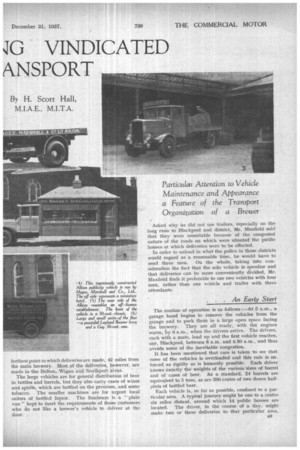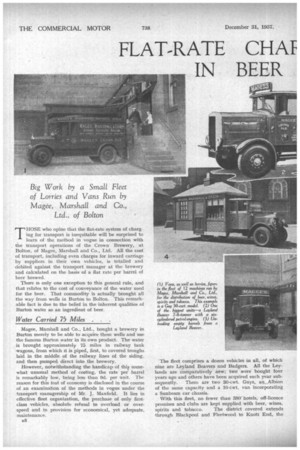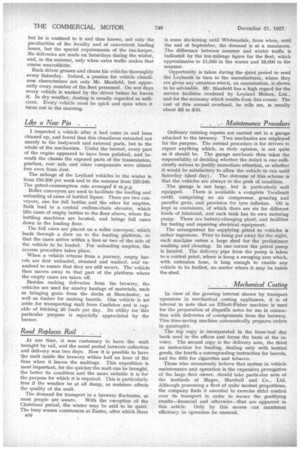By H. Scott Hall, M.I.A.E., M.I.T.A.
Page 21

Page 20

Page 22

If you've noticed an error in this article please click here to report it so we can fix it.
THOSE who opine that the flat-rate system of charg ing for transport is inequitable will be surprised to learn of the method in vogue in connection with the transport operations of the Crown Brewery, at Bolton, of Magee, Marshall and Co., Ltd. All the cost of transport, including even charges for inward carriage by suppliers in their own vehicles, is totalled and debited against the transport manager at the brewery and calculated on the basis of a flat rate per barrel of beer brewed.
There is only one exception to this general rule, and that relates to the cost of conveyance Of the water used for the beer. That commodity is actually brought all the way from wells in Burton to Bolton. This remarkable fact is due to the belief in the inherent qualities of Burton water as an ingredient of beer.
Water Carried 75 Miles . . .
Magee, Marshall and Co., Ltd., bought a brewery in Burton merely to be able to acquire these wells and use the famous Burton water in its own product. The water is brought approximately 75 miles in railway tank Wagons, from which it is piped, first, to covered troughs laid in the middle of the railway lines of the siding, and then pumped direct into the brewery.
However, notwithstanding the handicap of thi somewhat unusual method of costing, the rate per barrel is remarkably low, being less than 9d. per unit. The reason for this feat of economy is disclosed in the course of an examination of the methods in vogue under the transport managership of Mr. J. Maxfield. It lies in effective fleet organization, the purchase of only firstclass vehicles, absolute refusal te overload or overspeed and in provision for economical, yet adequate, maintenance.
138 The fleet comprises a dozen vehicles in all, of which nine are Leyland Beavers and Badgers. All the Leylands are comparatively new; two were bought four years ago and others have been acquired each year subsequently. There are two 30-cwt. Guys, an Albion of the same capacity and a 10-cwt. van incorporating a Sunbeam car chassis.
With this fleet, no fewer than 380 hotels, off-licence premises and clubs are kept supplied with beer, wines, spirits and tobacco. The district covered extends through Blackpool and Fleetwood to Knott End, the farthest point to which deliveries are made, 42 miles from the main brewery. Most of the deliveries, however, are made in the Bolton, Wigan and Southport areas.
The large vehicles are for general distribution of beer in bottles and barrels, but they also carry cases of wines and spirits, which are bottled on the premises, and some tobacco. The smaller machines are for urgent local orders of bottled liquor. The Sunbeam is a "plain van" kept to Meet the requirements of those customers who do not like a brewer's vehicle to deliver at the door. Asked why he did not use trailers, especially on the long runs to Blackpool and district, Mr. Maxfield said that they were unsuitable because of the congested nature of the roads on which were situated the public houses at which deliveries were to be effected.
In order to unload in what the police in those districts would regard as a reasonable time, he would have to send three men. On the whole, taking into consideration the fact that the solo vehicle is speedier and that deliveries can be more conveniently divided, Mr. Maxfield finds it preferable to use two vehicles with four men, rather than one vehicle and trailer with three attendants. •
. . An Early Start
The routine of operation is as follows :—At 5 a.m., a garage hand begins to remove the vehicles from the garage and to park them in a large open space facing the brewery. They are all ready, with the engines warm, ty 6 a.m., when the drivers arrive. The drivers, each with a mate, load up and the first vehicle reaches, say, Blackpool, between 8 a.m. and 8.30 a.m., and thus avoids some of the inevitable congestion.
It has been mentioned that care is taken to see that none of the vehicles is overloaded and this rule is enforced as rigidly as is humanly possible. Each driver knows exactly the weights of the various sizes of barrel and of cases of beer. As a standard, 24 barrels are equivalent to 5 tons, as are 200 crates of two dozen halfpints of bottled beer, Each vehicle is, so far as possible, confined to a particular area. A typioal journey might be one to a centre six miles distant, around which 14 public houses are located. The driver, in the course of a day, might make two or three deliveries to that particular area,
but he is confined to it and thus knows, not only the peculiarities of the locality and of convenient loading hours, but the special requirements of the inn-keeper. No deliveries are made on Saturdays during the winter, and, in the summer, only when extra traffic makes that course unavoidable.
Each driver greases and cleans his vehicles thoroughly every Saturday. Indeed, a passion for vehicle cleanliness characterizes not only Mr. Maxfield, but apparently every member of the fleet personnel. On wet days every vehicle is washed by the driver before he leaves it. In dry weather, dusting is usually regarded as sufficient. Every vehicle must be spick and span when it turns out in the morning.
Like a New Pin .
I inspected a vehicle after it had come in and been cleaned up, and found that this cleanliness extended not merely to the bodywork and external parts, but to the whole of the mechanism. Under the bonnet, every part of the engine appeared to have been polished, and beneath the chassis the exposed parts of the transmission, gearbox, rear axle and other components were almost free even from dust.
The mileage of the Leyland vehicles in the winter is from 150-200 per week and in the summer from 220-240. The petrol-consumption rate averaged' 8 m.p.g. Roller conveyors are used to facilitate the loading and unloading of cases of bottled liquor. There are two conveyors, one for full bottles and the other for empties. Both lead to a central endless-chain elevator, which lifts cases of empty bottles to the floor above, where the bottling machines are located, and brings full cases down to the loading floor.
The full cases are placed on a roller conveyor, which leads through a door on to the loading platform, so that the cases arrive within a foot or two of the side of the vehicle to be loaded. For unloading empties, the reverse procedure takes place.
When a vehicle returns from a journey, empty barrels are first unloaded, steamed and washed, and examined to ensure that they are still secure. The vehicle then moves away to that part of the platform where the empty cases are taken off.
Besides making deliveries from the brewery, the vehicles are used for sundry haulage of materials, such as bringing grain from the docks at Manchester, as well as timber for making barrels. One vehicle is set aside for transporting malt from Castleton and is capable of fetching 20 loads per day. Its utility for this particular purpose is especially appreciated by the brewer.
Road ReplacesRail . .
At one time, it was customary to have the malt brought by rail, and the usual period between collection and delivery was two days. Now it is possible to have the malt inside the brewery within half an hour of the time when it leaves the maltings. This expedition is most important, for the quicker the malt can be brought, the better its condition and the more suitable it is for the purpose for which it is required. This is particularly true if the weather be at all damp, as moisture affects the quality of the malt.
The demand for transport in a brewery fluctuates, as most people are aware. With the exception of the Christmas period, the winter may be said to be quiet. The busy season commences at Easter, after which there 1310 is some slackening until Whitsuntide, from when, until the end of September, the demand is at a maximum. The difference between summer and winter traffic is indicated by the ton-mileage figure for the fleet, which approximates to 11,000 in the winter and 19,000 in the summer.
Opportunity is taken during the quiet period to send the Leylands in turn to the manufacturer, where they are given any attention which, on examination, is shown to be advisable. Mr. Maxfield has a high regard for the service facilities rendered by Leyland Motors, Ltd., and for the economy which results from this course. The cost of this annual overhaul, he tells me, is usually about £8 to £10.
Maintenance Procedure
Ordinary running repairs are carried out in a garage attached to the brewery. Two mechanics are employed for the purpose. The normal procedure is for drivers to report anything which, in their opinion, is not quite as it should be. The garage mechanic then takes the responsibility of deciding whether the defect is one sufficiently serious to justify immediate attention, or whether it would be satisfactory to allow the vehicle to run until Saturday (shed day). The outcome of this scheme is that the vehicles are always in the pink of condition.
The garage is not large, but is particularly well equipped. There is available a complete Tecalemit outfit, comprising an air compressor, greasing and paraffin guns, and provision for tyre inflation. Oil is kept in containers, of which there are six for different kinds of lubricant, and each tank has its own metering pump. There are battery-changing plant, and facilities for testing and repairing electrical equipment.
The arrangement for supplying petrol to vehicles is rather ingenious. Prior to being put away for the night, each machine enters a large shed for the preliminary washing and cleaning. In one corner the petrol pump is located. The delivery pipe from the pump is taken to a central point, where is hung a swinging arm which, with extension hose, is long enough to enable any vehicle to be fuelled, no matter where it may be inside the shed.
. . Mechanical Costing
In view of the growing interest shown by transport operators in mechanical costing appliances, it is of interest to note that an Elliott-Fisher machine is used for the preparation of dispatCh notes for use in connection with deliveries of consignments from the brewery. This time-saving machine automatically prepares orders in quintuplet.
The top copy is incorporated in the loose-leaf day book used in the offices and forms the basis of the invoice. The second copy is the delivery note, the third an instruction for loading, dealing only with bottled goods, the fourth a corresponding instruction for barrels, and the filth for cigarettes and tobacco.
Those who erroneously believe that system in vehicle maintenance and operation is the expensive prerogative of the large fleet owner, should take particular note of the methods of Magee, Marshall and Co., Ltd. Although possessing a fleet of quite modest proportions, the company finds it essential to exercise strict control over its transport in order to secure the gratifying results—financial and otherwise—that are apparent in this article. Only by this means can maximum efficiency in operation, be ensured.
































